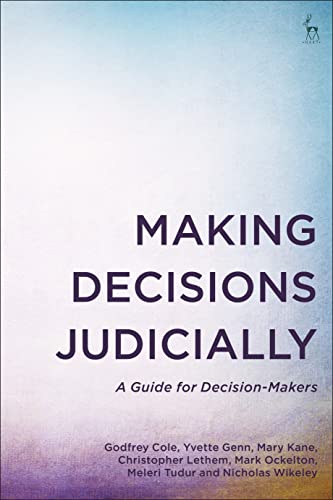A guide for Decision-Makers. Godfrey Cole, Yvette Genn, Mary Kane, Christopher Lethem, Mark Ockelton, Meleri Tudur and Nickolas Wikeley. Hart Publishing 2022, pp192

Content and Purpose
Members of The Academy do not generally make such decisions. They do when practising as experts seek to “clarify the issues for the court” and to influence such decisions on behalf of their clients. When acting as Expert Determiners, they do make such decisions. Studying the judicial decision-making process and engaging members of the judiciary in TAE evening events has long been a significant part of The Academy’s work.
This volume:
“Concerns decision-making in judicial and quasi-judicial contexts where there are settled requirements to ensure the accuracy of decisions and the fairness of the process by which such decisions have been reached.”
The topics addressed include:
Ethics
Communication and vulnerable witnesses
Case preparation and management
Evidence
A fair hearing
Making and communicating the decision.
Whilst this volume has been written to assist judges in honing their skills, it may also usefully inform those such as Academy members who work with decision-makers. The best experts present their evidence with simplicity and clarity. Those who have been through a good programme of expert training and read this are unlikely to be surprised by its content, but it will help to connect elements you have encountered before, giving them context and coherence. I believe that I am able to write a shorter report with greater impact by using the understanding it has given of the judicial process.
Ethical Decisions
Because judges make decisions on behalf of others, the integrity with which they approach their task is of highest importance. The Bangalore Principles of Judicial Conduct are referred to as setting the standard and are explained.
Vulnerable Witnesses
The section on communicating with vulnerable witnesses would appear to be most relevant to those working with the Family Courts and some areas of criminal work. The Judicial College has published The Equal Treatment Bench Book. Effective communication underpins all aspects of the process, from establishing personal needs to providing supportive resources.
Case Preparation and Management
Case preparation and management is an area that affects all witnesses, but our involvement is typically indirect. Your reviewer found this section informative in lifting the veil on an area that was largely unknown. Counsel will seek to establish ground that is favourable to their case. The judge may occasionally need to deal with parties who appear to have ulterior motives. In other occasions, the greater concern may be to give equity of arms where one party is represented and another is not. All will be affected by attempts to focus the issues, an area in which expert advisors play a part.
Evidence
The section on evidence is of greatest interest to Experts. Expert training typically addresses areas such as the burden of proof. There are useful expositions on the ways in which these steer the judge’s thought-process to form a subjective view and supporting that with a rationale. The essential question for a judge working on the balance of probabilities is stated as:
“Does the evidence persuade me that this probably happened, with sufficient force to make me content to decide that it did?”
The sub-section on Assessing the Evidence goes to the heart of what the expert aims to inform. The instruction is to assess reliability, credibility, plausibility. From this, the judge will go on to finding the Facts and assembling a decision on them.
A Fair Hearing
The section on the hearing talks to what goes in to making it fair. Here, perceptions are just as important as substance. The approach concentrates on the losing party’s perception of having been treated fairly and the means of managing this.
The decision has to be robust in withstanding challenge. Few judges are likely to enjoy having their decisions over-turned on appeal. Decisions concern findings of fact and of law. Judges are strongly encouraged to be brief in their reasoning, and to tailor language to their audience. A structure and content of decision is proposed.
An expert who understands to whom they are speaking and the approach taken by the judge is likely to be more helpful, informative and persuasive than one who does not. This volume is clearly structured and communicated and is likely to aid understanding and improve the quality of presentation of evidence.
…………………….
This Article was first published in The Expert and Dispute Resolver (TEDR) Volume 28 No. 2, the journal of The Academy of Experts. It is republished with permission.




